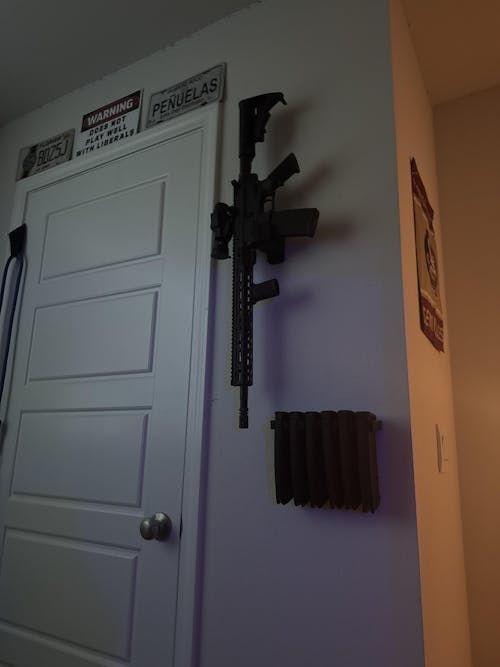Ultimate Hunting Pack List: Essential Gear Checklist
August 08, 2024 5 min read
Packing for a hunting trip can feel overwhelming, with many gear options to consider. One misstep in preparation could spell trouble out in the wild. This article provides a clear checklist of essential items, covering everything from clothing and survival kits to food and navigation tools.

Once you finalize your kit, head over to Spartan Mounts to grab some storage and organization solutions for your bows, ammo, shotguns, and so much more!
Essential Clothing for Hunters

Wear clothes that match the weather. Choose boots that won't easily wear out.
Weather-appropriate attire
Hunters need the right clothes for different weather. For cold days, wear layers like a First Lite Chama Hoody and a Sawtooth Hybrid Jacket to keep warm. In rainy conditions, pack the First Lite Vapor Stormlight Rain Jacket to stay dry.
Merino wool is great because it wicks moisture away from your skin.
Footwear should be strong and durable for rough terrains. Choose boots that keep feet dry and offer good support. Sturdy shoes can prevent blisters on long hikes. Wear proper socks too—ones made of materials that draw sweat away from feet, like merino wool or nylon mixes.
Durable footwear

Good boots make a big difference in hunting. Lowa Tibet GTX boots are strong and keep your feet dry. They hold up well even in rough areas. Boots like these prevent blisters and give support.
Wear good socks, too. First Lite Mountain Athlete Triad Socks keep feet warm and wick moisture away. You won't have sore feet after walking all day on different ground. Mix the right shoes with the right socks for happy feet during long hunts.
Navigation and Communication Tools
A GPS unit keeps you on track during your hunt. Use a satellite phone for quick calls in remote areas.
GPS unit and maps

A good GPS unit is vital for backcountry hunters. Compared with traditional methods, these devices offer accurate tracking and can help you find your way in remote areas. OnX maps and apps are great tools—they provide detailed offline maps so that you don't get lost even if there's no cell signal.
Having a paper map as a backup is wise too. It ensures you're never without navigation help. Make sure to store it in a waterproof bag to keep it safe from rain or spills. This method adds little pack weight but offers huge peace of mind.
Satellite phone
A satellite phone is vital for hunting trips in remote areas. It works almost anywhere because it connects to satellites, not cell towers. Garmin InReach is a good option with text capability and an emergency locator.
In places where regular phones fail, a satellite phone keeps you connected. It's also great during emergencies when you need help fast. Whether on late-season hunts or exploring elk country, this device can be your lifeline.
Hunting Gear Must-Haves

You need a reliable weapon and ammunition. Don't forget your optics—binoculars and a range finder are key.
Weapon and ammunition
Bring a reliable rifle for your hunt. Make sure it’s suited for sub-freezing temperatures if applicable. Pack extra ammo so you’re ready for any situation. Carry different types of ammunition to match various weather conditions and hunting needs.
For an elk hunt, include a bugle tube and diaphragm reeds in your pack. These help mimic elk calls, which can lure them closer. Don’t forget sharpening tools for the knife you carry; a dull blade won’t do much good out there!
Optics like binoculars and range finders
Optics are important for hunting. Binoculars help you see animals from far away. The Vortex Razor 10x42 binoculars offer clear views and work well in low light. They are a good choice for any type of hunt.
Range finders show how far away something is, making your shot more accurate. A high-quality range finder can be the difference between success and missing your target altogether. Both tools save time and effort during backpack hunts or day hunts in tough places like the high country mule deer hunt or late-season deer hunting.
Survival Kit Essentials

A well-packed survival kit can save your life in the wild. Carry items that help you stay safe and warm... like a small first aid kit and fire-starting tools.
First aid kit
Pack a small first aid kit in your hunting gear. Include 2 gauze pads and 4 band-aids for cuts and scrapes. Athletic tape (½ roll) can help with sprains or securing bandages.
A small bottle of Gold Bond helps with itching or rashes. This simple kit keeps you prepared for minor injuries during your hunt.
Emergency shelter and fire-starting tools
A space blanket can save lives in cold weather. Keep one in your day pack. It is lightweight and takes up little room. For shelter, a ground cloth or tarp works well to block wind and rain.
Always have multiple ways to start a fire. Matches, lighters, and magnesium flint sticks are good options. A small stove like the MSR Windburner with an isopro fuel canister adds extra safety for cooking food during emergencies too.
Food and Water Necessities
You need to pack high-energy snacks like dried fruit and nuts for your trip. Bring a water filter or purification tablets to keep your water clean and safe.
High-energy snacks
Hunting can be exhausting, so high-energy snacks are crucial. Pro Bar offers a great option with its nutrient-dense bars that pack a punch. Clif Builders Protein Bars are perfect for muscle recovery after a long day.
Nature’s Bakery Fig Bars provide natural sweetness and fiber to keep you going.
Dark chocolate nuggets are another excellent choice—they boost energy and improve mood. These snacks fit well in any hunting pack without adding much weight. Stocking up on these will ensure you stay fueled during your adventure.
Water filter and hydration system
Clean water is crucial out in the wild. A Platypus Gravity Works 2L water filter helps ensure you have safe drinking water. It’s easy to use and doesn’t take up much space in your backpack hunting gear list.
For storing, the Platypus Big Zip LP 3 Liter and MSR Dromedary 4 Liter Bag are solid choices. These hydration systems can hold enough water for a long hunt without adding too much extra weight.
Always carry a good supply of clean water... staying hydrated keeps you sharp during your adventure!
Conclusion
A good hunting trip starts with solid planning. Pack the right clothes for the weather. Make sure your boots are tough and comfy. Don't forget a GPS unit, maps, and maybe a satellite phone.
Carry your weapon, ammo, and optics like binoculars.
Take a first aid kit along with fire-starting tools in case of emergencies. Snack wisely to keep energy high; pack water filters or hydration systems too... Stay organized by using self-contained kits in your pack for easy access.
Happy hunting!
FAQs
1. What essential gear items should I pack for my first hunting trip?
For your first trip, bring a sleeping bag, game bags, rain gear, water bottle, and a good headlamp. Don't forget toilet paper and hand sanitizer.
2. How much food should I carry for backcountry hunting?
Pack enough food for the entire time of year you plan to hunt. Early September hunts may require less than late-season ones.
3. What kind of clothing is best for different weather conditions?
Warm clothes are crucial for cold weather, while lightweight fabrics work better in warmer climates. Always prepare for varying conditions.
4. Do new hunters need specific equipment?
Yes! New hunters should have a kill kit, spare batteries, folding knives and extra broadheads—these are some of the most important items.
5. Is there any special gear needed when backpack hunting?
Backpack hunters will need backpacks with high cubic inches capacity to hold all their gear including camp shoes and spotting scopes.
6. Why is it important to bring a cell phone or digital mapping tool?
A cell phone or digital mapping tool helps navigate unfamiliar areas and stay safe...creators of the best digital mapping tools often recommend them as must-haves.
Categories
Let customers speak for us
from 1919 reviews
Perfect addition to mh tactical wall

Amazing products…. All of them

Loved everything about it. No complaints

Works great. No complaints, and highly recommend them.

Like this mount is totally bodacious, got it hanging right on me bed room door for quick access

A needed vise block that performs well.
I purchased this along. With one for the Sig MPX, the HK MP5 and the Glock pattern AR will be purchasing others look forward to one for the FN FAL and the HK G3

Very strong and sturdy! Will be buying more!

They are great! Glad my buddy recommended them to me! Will buy other products !

I like the look and quality of it plus it holds the pistol in a real easy accessible position.

Let me say that this company is amazing. I ordered a keltec ksgwall mount and it was to small since there is a mounted light so I needed it to be a bit wider. I told the company and they said they will make me one! Unreal! The new one now fits perfectly! Thanks so much. I highly recommend them.

Very nice mount and easy to install. Magazines fit perfectly!

I purchased this Spartan Mount for a JTS M12AR 12ga. Shotgun. It's made really well with a nice finish. Low profile, and I like that the type gun and model are molded into the mount. It fits and locks into the magwell perfectly with no lose motion. I'm sure it will last forever!
Thanks Spartan Mounts for a great well made product.
I purchased a KRISS Vector First Gen Stock Adapter Hinge 5 years ago and it has been great. I had a little bit of play in it after 5 years of abuse, reached out and Ben helped me out. No questions asked, sent me a new one! I can't vouch for them enough. Thank you!!
The fact that something like this even exists is awesome.

My 2nd one, works as good as the first one but smaller.

Solid mount- fits snug and I may loosen it a bit but holds rifle with mag and a soare
